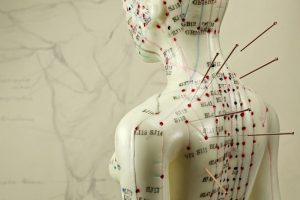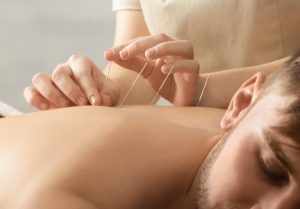Acupuncture may help if conventional medicine has not adequately treated your condition. It can be used alongside conventional treatments. Acupuncture may also help if you suffer from chronic pain. Below is more information about what acupuncture is, how it works, what types of conditions it can help, and how to determine whether it is right for you.
What Is Acupuncture, and How Does It Work?

Acupuncture has been used by the Chinese for centuries to relieve ailments and pain. In acupuncture, a trained acupuncturist places needles into the body to alleviate symptoms.
Using fine steel needles no bigger than a human hair, an acupuncturist targets various acupuncture points throughout the body, also called acupoints. There are hundreds of acupoints in the body along 14 major meridians, which are energy-carrying channels. Acupuncture helps the body release symptom-fighting chemicals and helps to re-balance the body’s energy.
Chinese medicine calls the energy that flows through the body qi (pronounced “chee”). Chinese medicine practitioners believe qi disruptions create energy imbalances in the body, which can lead to pain and illness. Inserting the needles is thought to correct imbalances in the qi. Simply put, acupuncture can help stagnated energy move more efficiently.
Who Can Acupuncture Help?
You will first want to obtain a medical diagnosis of what is causing your pain or symptoms from your medical provider. That way, you can share the diagnosis with your acupuncturist so they can provide the best help.
For example, if you have severe lower back or sciatica pain, your doctor may diagnose that a ruptured disk is impinging on a nerve, causing pain to radiate down your leg. Even if you and your doctor decide that surgery is the ultimate solution, acupuncture may help alleviate your pain before surgery and as part of your recovery.
Many people who seek acupuncture do so after conventional treatments have failed. Many have tried injections, surgery, or physical therapy, and those treatments have not fixed the pain. Acupuncture may help people in those situations.
What Are Some Ailments Acupuncture Can Help?
Patients have found acupuncture helpful in treating a variety of conditions, including:
- Cancer and side effects from cancer treatment
- Low back pain and sciatica
- Neck pain
- Joint pain, such as tennis elbow or knee pain
- Sprains
- Carpal Tunnel and other repetitive strain disorders
- Headaches and migraines
- Facial pain and other nerve pain
- Dental pain
- Rheumatoid arthritis
- Nausea and vomiting, including from morning sickness or chemotherapy
- Menopause and hot flashes
- Depression
What Happens During an Acupuncture Session?

First, you should let your general healthcare provider know you are obtaining acupuncture treatment. Communicating with your doctor can ensure that your doctor and your acupuncturist work together on the best whole-body approach to your treatment.
The first time you meet, your acupuncturist assesses your condition and examines your body for acupoints. The acupuncturist places the needles into the appropriate acupoints on your body to treat your condition.
The U.S. Food and Drug Administration (“FDA”) regulates acupuncture needles and requires that all acupuncture needles are as thin as human hair, solid, sterile, non-toxic, and steel. They are for one-time use only and are discarded after each session.
Acupuncture needles are placed from ¼ inch to two inches deep. The needles will need to stay in for up to twenty minutes, depending upon the situation.
After the session ends, you may want a ride home, particularly after your first session. Acupuncture has a calming effect. If you cannot get a ride home, try to rest for fifteen minutes before you drive.
How Does Acupuncture Feel, and Is It Dangerous?
When done correctly, acupuncture is less painful than receiving a shot. There might be a slight pinch when the needles are placed, but the process is virtually painless when a skilled acupuncturist does it. One of the reasons it is less painful is because the needles are thinner than those used for shots and are sold instead of hollow.
You may feel tingling or aching in your muscles. Those sensations generally are a good sign that the treatment is working. When done correctly, there are few acupuncture side effects or complications.
Contact Us Today to Discuss Your Acupuncture Options
You can use acupuncture alongside your conventional pain treatment if you suffer from chronic pain, nausea, or other conditions discussed above. Acupuncture might also help when conventional therapies have failed.
The Jersey City acupuncture experts at AllCare Health & Pain want to help you so you don’t have to endure constant pain or discomfort. Call the AllCare Health & Pain pain management team today at 201-386-9800 or contact us via our online form to set up an appointment.
Related posts:

